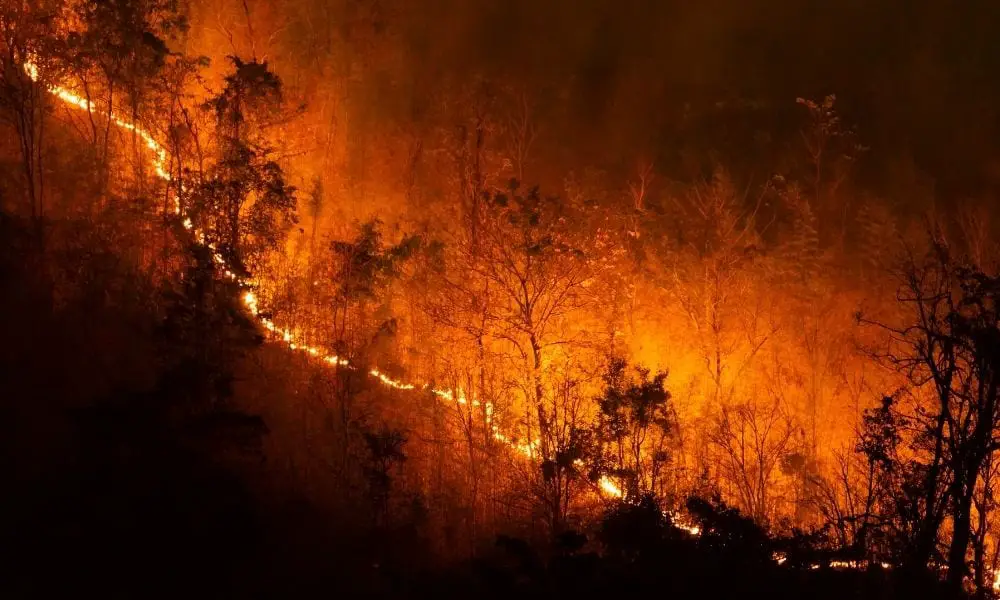

Wildfires are an increasingly prevalent issue faced by people all over the world. These untamed burns have the potential to do some serious damage to the land, animals, and humans in the areas they take over. One of the best ways to prevent wildfires is to be knowledgeable about them. To learn more about these destructive forces, check out these surprising facts about wildfires.
While some wildfires are started by natural events such as lighting strikes or volcanic activity, the grand majority are ignited by humans. It is for this reason that we must educate ourselves on wildfires and make an active effort to prevent them by changing our destructive behavior. Some of the most common ways that humans start wildfires include leaving campfires unattended, discarding cigarettes that aren’t completely extinguished, and unsafely burning large piles of debris.
Many people are familiar with the common saying “You can’t fight fire with fire.” Well, it turns out that you can. Originally, wildland firefighters implemented total suppression policies that focused on completely extinguishing all forest fires.
However, as wildland firefighting tactics evolved, firefighters realized that setting controlled or prescribed burns would allow them to reduce the accumulation of flammable fuels and decrease the magnitude of future wildfires in at-risk areas. In addition, controlled burns also help facilitate new growth of certain plants and trees which is necessary to create flourishing wildlife habitats.
After a wildfire occurs, its damaging impact can continue for many years. Following a wildfire, it takes an average two to four years before restoration efforts can even begin. Before that time, new saplings cannot survive in the scorched, dry soil. Until the soil has naturally replenished overtime, it is unable to support new life. In addition, it can take a while before large-scale reforestation efforts are able to mobilize which can further contribute to slower recovery times.
It’s no secret that wildfires are destructive, but the sheer scale at which they cause widespread devastation may shock you. In 2020 alone, there were 52,934 wildfires which scorched 9.5 million acres of land across the United States, according to the National Interagency Fire Center. Such fires have resulted in the deaths of dozens of people, created billions of dollars in damage, and has destroyed thousands of buildings. These statistics become even more harrowing as we remember that most \wildfires are human-caused and could have been prevented.
FAQ
While some wildfires are started by natural events such as lighting strikes or volcanic activity, the grand majority are ignited by humans. It is for this reason that we must educate ourselves on wildfires and make an active effort to prevent them by changing our destructive behavior. Some of the most common ways that humans start wildfires include leaving campfires unattended, discarding cigarettes that aren’t completely extinguished, and unsafely burning large piles of debris.
However, as wildland firefighting tactics evolved, firefighters realized that setting controlled or prescribed burns would allow them to reduce the accumulation of flammable fuels and decrease the magnitude of future wildfires in at-risk areas. In addition, controlled burns also help facilitate new growth of certain plants and trees which is necessary to create flourishing wildlife habitats.
Additional Resources:
Tundra
Ocean
Pacific Ocean
Atlantic Ocean
Caspian Sea
Discover five warning signs that indicate it’s time to replace your car. From repair costs…
Having PPE on hand isn’t enough to protect your team. Learn how to enhance safety…
When it comes to maintaining or upgrading a home, roofing is often one of the…
When it comes to maintaining the integrity and value of your property, a sturdy roof…
When it comes to maintaining and enhancing the integrity of any structure, the quality of…
Rhode Island, renowned for its scenic coastlines and historic architecture, presents unique challenges and opportunities…